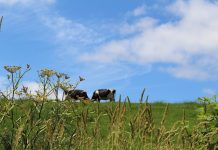OPICO, El Salvador – In 1989, Gilberto Mancia left war-torn El Salvador to work in the United States building and repairing air conditioning units. He never imagined he would stay in the United States permanently, but he always dreamed of returning home and buying a farm.
Two years ago, Mancia realized that dream, moving back to Opico, El Salvador, and buying a small plot of land.
It had been decades since Mancia had worked on a farm, but he planned to return to the type of agriculture he knew from his childhood – growing corn and beans, and perhaps raising a few dairy cows.
Value. However, Fintrac, an international agricultural support organization, had another suggestion – high-value horticulture.
Fintrac has a grant from the U.S. Agency for International Development to help improve and diversify El Salvador’s agricultural production.
Fintrac’s Dennis Lesnick said improved farming techniques and high-value crops have allowed many Salvadoran farmers to raise their revenue by more than 500 percent in just one year.
Mancia’s son Edwin, who returned to El Salvador to work with his father, first heard about Fintrac’s project through an informational meeting the organization held with the farmers in his community.
Sold. After describing the project, Fintrac’s agronomists took interested farmers to visit sites around the country where they had successfully implemented their strategies. Edwin and his father were sold on the proposal.
Fintrac’s Lesnick said it often is easier to convince new farmers to participate in the project because they are not yet wedded to traditional work methods.
He said the only things Fintrac looks for in its farmer partners are land, access to water, a modest amount of investment capital and a willingness to follow the agronomists’ advice.
Elements. When a farmer signs on for the project, Fintrac assigns an agronomist to assist him or her for 18 to 24 months. Fintrac subsidizes the cost of equipment to create raised beds, install a drip irrigation system and set up insect traps.
Lesnick explained that raised beds help fight soil erosion and protect plants from being washed away during the rainy season.
The drip irrigation system provides more accurate control of water delivery to the roots of each plant while reducing water waste. It also allows farmers to plant year round.
The irrigation system allows the farmer to raise crops in the off season when the crops fetch higher market prices. The farmer also can inject fertilizer into the irrigation system and ensure accurate delivery of the necessary nutrients to each plant with minimal labor.
Fintrac uses insect traps and insect netting to protect young plants and eliminate the need for insecticides. The organization also subsidizes the cost of seeds and seedlings for high-value fruit and vegetable crops such as bell peppers, tomatoes, onions, potatoes, cucumbers, squash, cabbage, plantains, guava and papaya.
Demand. Lesnick said there is such a high demand for these crops in El Salvador that the market often draws imports from neighboring countries. Consequently, all of Fintrac’s efforts are focused on supplying the local market.
With operations in neighboring Honduras and Guatemala, Fintrac is able to monitor local and regional agricultural production, and its agronomists can advise the farmers when best to plant their crops to benefit from the most favorable market prices.
No predators. The organization also provides farmers with daily market price reports via text message so they are not prey to predatory buyers.
Lesnick said this system has “destroyed the chain of abuse” whereby buyers purchased crops from uninformed farmers at prices well below the crops’ market value.
Mancia is still in the first year of his new endeavor, but he said he is pleased with the results.
He is able to sell his bell peppers to retailers in nearby San Salvador for a tidy profit and has set aside enough money to bring more of his land under production using the strategies he has learned from Fintrac.
Get 4 Weeks of Farm and Dairy Home Delivered









